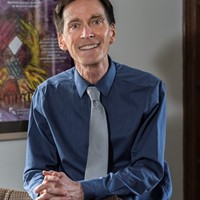To answer questions about the future, we tend to draw trajectories from our present experience: “If X continues on its current path, then Y and Z are likely to be the outcomes.” Applying this strategy to the future of the church can be discouraging: our present experience as Catholic Christians is far from rosy, so the prospects for the future appear bleak. Still, passivity and hopelessness are our only options as a Christian community.
Approaching our future with both hope and creativity is possible if we build that future on the grace of the Holy Spirit. The Spirit is the gift that we all share through our common baptism. The role of the Spirit’s grace is twofold: to draw us more deeply into a relationship with God’s love made visible in Jesus Christ (John 16: 13-15); to guide the church on its pilgrimage through history to the fullness of life in Christ.
In our present moment of history, grace is especially evident in the process of synodality that Pope Francis has championed with great energy and enthusiasm. Synodality gives flesh to who we are as a community sharing the one faith and called to the one mission. In his many addresses and writings on synodality, the one word that, more than any other, expresses Pope Francis’s understanding of the process is “listen”.
What we are to listen for, Pope Francis stresses, is the Holy Spirit. It is no accident, then, that Australia’s Plenary Council sought to ensure that its deliberations and decision making about the future of the church in Australia have their foundation in listening to the Spirit.
Two obvious questions about this listening: What might we hear from the Spirit and how are we to listen? Here, happily, a whole range of interconnected
answers present themselves:
- our individual and communal prayer, which both proceed from the gift of the Spirit we receive through our baptism, draws us to Christ and to living as Christ’s disciples;
- spending time with Scripture and participating in the church’s liturgy also open us to the presence of the Spirit guiding the church;
- listening to other members of the community of faith at parish, diocese, and national level; this process invites us to trust that the Spirit, moving in and through the community of faith whose members, from the youngest to the pope, share the one baptism, draws us to choose Christ-centred ways of living;
- listening to our world—its sufferings, hopes, and challenges to the church highlight where we fail to practise the justice and compassion we profess
and where we need conversion.
This listening can guide our creative responses to the challenges we face as a church. Clearly, this is not a magic bullet or a “join-the-dots” process to melt every obstacle. It is, however, a process that has deep roots in the church’s history. Being attentive to the Spirit enables us to engage our present and future with hope, imagination, creativity, and courage as we seek “what has seemed good to the Holy Spirit and to us” (Acts 15: 28).
Richard Lennan is a priest of the Diocese of Maitland-Newcastle, ordained in 1983. He is the Professor of Systematic Theology in the School of Theology and
Ministry at Boston College, USA
Follow mnnews.today on Facebook.




























































































